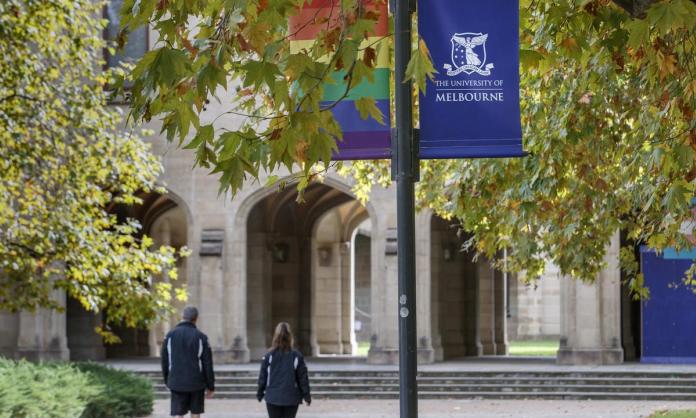Members of the National Tertiary Education Union (NTEU) at the University of Melbourne are embarking this week on historic strike action. Ten months into our campaign for a new workplace agreement, management has refused to budge on our major demands. After a four-hour stoppage in May and a 24-hour stoppage in June, we are intensifying pressure in second semester with a weeklong strike. This will be the longest large-scale strike action at an Australian university campus for a decade or more.
The escalation was sparked by members in the arts faculty, who voted to strike for seven days starting today. Their decision was only possible after years of dedicated work by activists that made arts the best-unionised area at the University. After the arts vote, a branch-wide meeting resolved to prepare for a half-day all-member strike. Members outside of arts jumped on the opportunity to build support for more extended action in their own workplaces.
A flurry of organising across departments in recent weeks culminated in a series of successful votes to join the weeklong action. Union members in student services, libraries and scholarly services, the law faculty and the VCA’s schools of art and stagecraft will now join arts on strike for the full week. These votes showed that there is appetite across the branch for sustained strikes to win our demands. Deep seated resentment towards management after years of cuts mean that many members are prepared to vote for action above and beyond what’s been done in previous bargaining rounds.
After the all-in action today, the weeklong strike will be limited to those areas that held votes for extended action. This will not be an all-member stoppage across the entire branch, despite the best efforts of militants to push for an all-out strike. But it will draw strength from the most organised and active work areas to seriously impact different levels of the university’s operations. And it can lay the basis for more recruitment and organisation, potentially opening the way for more all-out actions in future. When we participate in serious strikes, members get a chance to feel our own collective strength and develop strong arguments for our workmates to join the union. This week, strikers will be leafleting and running open union events to highlight the power of united action and to encourage engagement among all NTEU members.
This strike is a serious disruption to business as usual at Melbourne Uni—and also in the NTEU. It’s been quite some time since we’ve seen the union branch put forward an ambitious log of claims and embark on protracted strikes to push for them. The ambitious demands we put forward at the start of this bargaining round have inspired renewed levels of participation. In particular, the bold claim for a secure employment ratio—for 80 percent of all staff to be employed in ongoing roles—has inspired plenty of staff to get active in an institution in which most of us are on casual or fixed-term contracts. Claims for filling all vacant positions to address spiralling workloads, a wage rise that keeps up with inflation, and a strict limit on endless rounds of restructures have also inspired support.
The shorter work stoppages we’ve organised have been well-attended and lively, and have already forced some small concessions from management. With membership growing month-by-month, we are now the largest NTEU branch in Australia. What we win at Melbourne University—and how we win it—can have an impact across the country.
For decades, the NTEU has been stuck in a self-defeating cycle of lacklustre campaigns with modest demands that inspire little confidence in members. Our union leaders have shied away from serious industrial action, instead placing their faith in backroom negotiations to “win” small improvements around the edges. The inevitable outcome is that the union dilutes or withdraws its own demands, while members are left feeling disempowered and cynical about the bargaining process. So past NTEU campaigns have generally reinforced our weakness and lowered expectations about what our branches can achieve, instead of building union power.
The situation at Melbourne University today offers a glimpse of a different way forward. We’ve seen the potential for strong claims to inspire active participation from our workmates. It will be up to militant activists in the branch to resist a slide towards concessions in the coming weeks. This strike is the result of hard work from rank-and-file members. Let’s use it to expand our numbers, raise our own confidence and push beyond what’s been done before.










